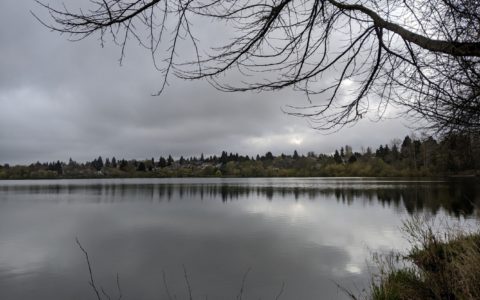Hope in the Dark: A Reflection on Coronavirus and Easter
Lisa Velin
Are you struggling to find hope in the dark? If so, I can relate.
The day before Easter this year, I awoke at 6:30 with a sense of urgency. I sensed stirrings deep within my soul. I told my husband I needed to walk and process. Something was rising to the surface that I needed to heed . . .
 Off I walked, not quickly, but purposefully to nearby Green Lake. As I methodically moved my feet, one after the other, my heart was just as steady and focused. As my feet dodged goose droppings and tree roots, my eyes scanned the scenery. The atmosphere was dark, still, and silent. The sky opened with occasional and dramatic sun peeks through the moving clouds. Even the birds seemed subdued.
Off I walked, not quickly, but purposefully to nearby Green Lake. As I methodically moved my feet, one after the other, my heart was just as steady and focused. As my feet dodged goose droppings and tree roots, my eyes scanned the scenery. The atmosphere was dark, still, and silent. The sky opened with occasional and dramatic sun peeks through the moving clouds. Even the birds seemed subdued.I was meditating on Good Friday and considering the utter desolation Jesus’ followers must have experienced on the day between Jesus’ death and resurrection.
Even though Jesus had told them that He would come back, they had not understood nor had they expected Him to die in the way that He did. They were most likely traumatized, as evidenced by the way many of them hunkered down in fear and sadness in that upper room. They had watched their King die a cruel and slow death. Jesus had died.
 How disoriented and confused, and maybe still in shock, they were on the day after His death. I feel nauseous even as I think about it. I have lost two significant people in my life — one I was with the moment she passed.
How disoriented and confused, and maybe still in shock, they were on the day after His death. I feel nauseous even as I think about it. I have lost two significant people in my life — one I was with the moment she passed.
As she took her last breaths, what was about five minutes seemed like hours. It was so excruciating to watch, even with the hope I will see her in heaven. I can’t imagine what this like for the disciples, with no grasp yet on what Jesus meant by, “Where I go, you will be with me also” (John 14:1-3).
Did the disciples lose hope in this in-between time? Were they suffering not only grief but also a lost sense of purpose or reason to live? Or were they still in a haze of disbelief? “How could this happen? Why did He not stop it? He is our King, our Lord! What do we do now?”

The mood of the lake today matched all those dark feelings. I paused more often than usual along the shores and took many pictures, with a sense of urgency and intense focus. It felt like the last time I would stand in that place. Maybe it was.
Soon after my last long pause by one of the docks, I heard the grating sound of a megaphone break through the stillness, a voice urging, “Get off the lake. The park is closed.” It was so jarring and so “other” than what I was experiencing in those quiet moments of reflection. Yet also somehow I knew it was coming.
I respectfully responded, “Okay, officer. I am leaving now,” as he drove slowly past me and repeated, “You have to leave now.” After he drove past me, I felt myself choking on some tears. I wanted to weep, to scream even.
Surprised by how strong my reaction was, I considered how Green Lake has been my daily go-to, especially since the threat of the Coronavirus. It has been a refuge. An escape. And now she is off limits “indefinitely.” But my reaction felt deeper than that.
I considered once again how the disciples and the women who were friends with Jesus must have felt the day after Jesus died. Trying to find purpose, hope in the dark, understanding — maybe pinching themselves because it didn’t seem real or possible.
 During this Coronavirus threat, I have had that sense often. Please hear that I know this is not on the same scale. But somehow the immediacy of this grief helped me be present more than ever to the experience of Jesus’ followers on that day before Resurrection. Maybe you related as you observed Easter this year.
During this Coronavirus threat, I have had that sense often. Please hear that I know this is not on the same scale. But somehow the immediacy of this grief helped me be present more than ever to the experience of Jesus’ followers on that day before Resurrection. Maybe you related as you observed Easter this year.
If you’re looking for hope in the dark, I invite you to contact me or another counselor to schedule an appointment. We would be happy to walk with you during this time.




